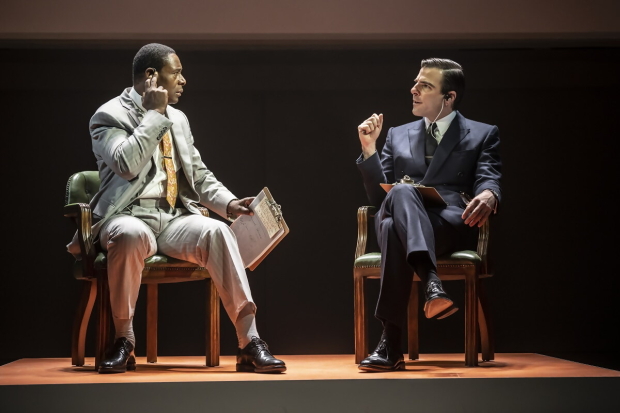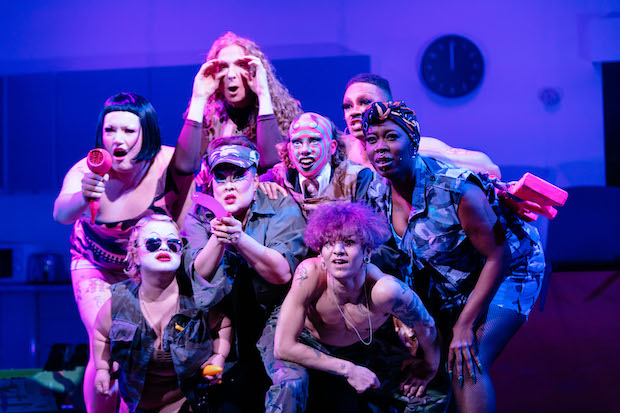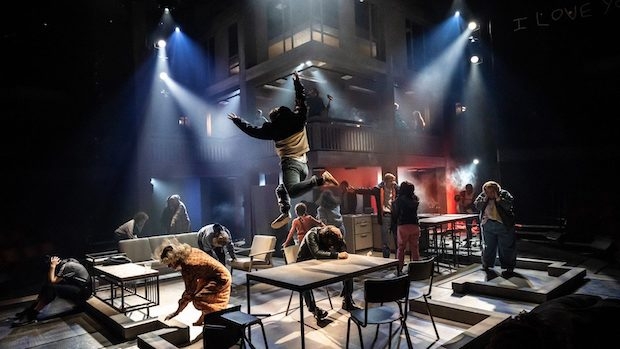Reviews: Best of Enemies, Sound of the Underground, and Standing at the Sky's Edge
TheaterMania checks out three new shows in London.
One thing becomes immediately clear to a New York theatergoer who spends any time in London: The playgoing culture here is entirely more joyous. Audiences show up early to hang out in the numerous little warrens and bars that decorate the theaters, and when they bring that last round to their seats, they can be trusted to do so without the dreaded sippy cub. New Yorkers rush to beat the bathroom line at intermission, while Londoners rush out to the bar — and to purchase ice cream, which is ubiquitous. This is true even at "subsidized" (not-for-profit) theaters like the Royal Court, where the downstairs bar is home to some of the most interesting conversation in the city. In fact, it sometimes eclipses the dialogue onstage.
Every season, London sends New York its best plays and musicals. But will a little bit of London's theatrical culture rub off on New York, a town where going to the theater too often feels like going to church? I sure hope so.

(© Johan Persson)
One show that seems destined to cross the pond is James Graham's Best of Enemies, which will conclude its run at the Noel Coward Theatre this Saturday. It's based on the 2015 documentary about the series of televised debates between William F. Buckley Jr. and Gore Vidal that took place around the 1968 GOP and Democratic conventions, boosting ratings for the struggling ABC network and accidentally inventing the shouting heads format that constitutes so much cable "news" today.
Making his London stage debut, Zachary Quinto nails Vidal's oversexed mid-Atlantic cadence, his cultivated sneer over a glass of champagne, and his ability to turn a phrase like he's twisting a knife into the bowels of his enemy. That would be Buckley, whom David Harewood embodies with the smug paternalism of a smalltown pastor, although his Buckley purr strangely veers into a Limbaugh growl. Both actors recapture the electricity of their duels, causing the audience to laugh and gasp at lines that were uttered on network television half a century ago.
Employing the exuberantly theatrical style we saw in Ink, Graham creates a live documentary, with the supporting cast playing network executives, student protesters, and expert commentators. (Who would have ever thought that WNYC host Brooke Gladstone would become a character in a West End play?) Under the caffeinated yet sharp direction of Jeremy Herrin, it mostly works to establish the context of political upheaval in the late '60s.
But Graham indulges in his digressions a bit too much, resulting in a play that often feels bloated: Syrus Lowe uncannily channels James Baldwin, who famously debated Buckley at Cambridge, and who becomes a major character here despite playing no role in the Vidal-Buckley showdown. A scene that depicts Buckley interviewing Enoch Powell (Tom Godwin) seems destined to be lost on New York audiences, should the show eventually transfer. And a mustachioed, bandana-wearing protester seems to play a significant role in the first act, only to disappear in the second. It seems quite possible for this two hour, 25-minute drama to lose a good half-hour without significantly undercutting the fascinating central story — it might even make for a better play.

(© Helen Murray)
There's no such hope for Sound of the Underground. Travis Alabanza's two hour, 25-minute whine masquerades as cutting-edge punk theater is its world premiere at the Royal Court, but it's one of the more tedious expressions of resentment I've yet encountered onstage.
It features a cast of London's (allegedly) most subversive drag artists hatching a plot to assassinate RuPaul for the crime of providing mainstream exposure to hundreds of their fellow performers, who can now earn a fulltime living thanks to their television fame (one wonders how many in the cast may have been Drag Race rejects).
Premised on the undergraduate notion that any art people want to pay for must be bad, Sound of the Underground is simultaneously disdainful and covetous of money, operating under the assumption that audiences will pay a premium to luxuriate in liberal guilt — which is a fair bet in Sloane Square. Certainly, few things can top the exquisite cringe of the scene in which the performers come into the audience to beg for money because the theater doesn't pay them enough.
The play's multi-genre format, which leaps from kitchen sink realism to documentary to high fantasy, lurches along under Debbie Hannan's uninspired direction. Alexandra Faye Braithwaite's sound design (tense chords and tick-tocks as the actors uneasily pour tea) is the most hilariously satirical element. But I could feel myself aging precipitously during an excruciating segment in which the cast silently dismantles Rosie Elnile and Max John's set.
The second half somewhat redeems the first when Alabanza suspends the plot Nutcracker style to allow the cast to do what they do best. Wet Mess and Ms. Sharon Le Grand dazzle us with their sartorial splendor, delivering standout performances that truly do upend expectations. And I may never forget the fabulous extravagance of Midgitte Bardot ascending a work lift to shower the stage in "hot piss."
But these superficially transgressive acts cannot conceal the reactionary soul of this play. "No one likes change," Ms. Sharon fumes about drag emerging from the underground to become, "sanitized, sanctioned, and following a rule book we didn't set." These sentiments eerily echo the complaints of rightwing demagogues who fear and despise a culture they no longer control. And in both cases, the embodiment of their angst is family-friendly drag performers. It's horseshoe theory, if the horse wore glittering platform heels.

(© Johan Persson)
"There's a difference between speaking truth to power and being a twat," says a character in Standing at the Sky's Edge, the new musical by Richard Hawley and Chris Bush that opened on Monday at the National Theatre. Its portrayal of hope and perseverance, even through the cruelest of circumstances, feels like a breath of fresh air in a stiflingly cynical world.
Set in and around a housing estate (translation: housing project) in Sheffield, it tells the story of one apartment and three generations of inhabitants from 1960 through present day. Rose (Rachel Wooding) and Harry (Robert Lonsdale) move in when the building is a shiny new promised land for the working class. Joy (Faith Omole) arrives in 1989 as a refugee from Liberia and quickly falls in love with Sheffield…and Jimmy (Samuel Jordan). He grew up there and wants out of a situation deteriorating under Thatcher, just as she thinks she's found a permanent home. London transplant Poppy (Alex Young) arrives in 2015, looking for a fresh start after a failed engagement to Nikki (Maimuna Memon).
Their overlapping journeys have the feeling of an epic novel, and through Bush's surefooted, big-hearted storytelling, we can't put it down. The characters begin to feel like old friends, sharing their triumphs and heartbreaks — and telling the story of modern Britain in the process.
Ben Stones's brutalist apartment block set seems to envelop the house of the Olivier Theatre, providing a giant canvas to director Robert Hastie. And like a great Renaissance painter, he takes full advantage, giving us so much to look at without ever losing the central focus of the story. Actors from different threads weave in and out like ghosts traversing the fabric of time, echoing universal human emotions through Lynne Page's lyrical choreography.
I'm a fairly jaded theatergoer and it takes a lot to make me tear up, but Standing at the Sky's Edge got me through the irresistible combination of a good story and Hawley's soul-stirring, gorgeously melodic music. While Hawley's songs don't do the typical work of driving the plot forward, they are essential in establishing a mood that sets the actors up to do the rest.
Omole brilliantly tells a story of teenage adaptation through her subtly shifting dialect. Her scenes with the steadfast Jordan are consistently the most moving in the show. Lonsdale endows Harry with a working man's quiet dignity facing the assault of the late 20th century. And Wooding blows us away with her unshakable fortitude and powerful voice.
Evoking the full spectrum of emotions, Standing at the Sky's Edge is everything we want from musical theater. I suspect that anyone who sees it will be recalling this unforgettable show for years, as they enjoy their Häagen-Dazs at the interval. Performances are scheduled through March 25, so if you're in London before then, don't miss it.








